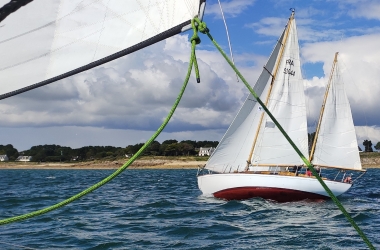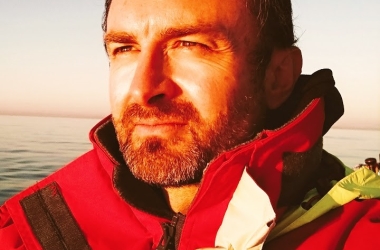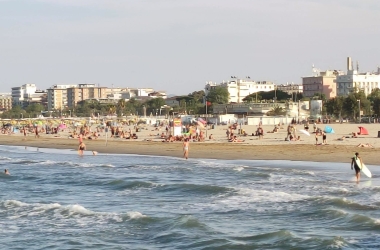Alberto Forte on Rethinking Yachting Tourism for a Regenerative Future
Alberto Forte on Rethinking Yachting Tourism for a Regenerative Future

Alberto Forte on Rethinking Yachting Tourism for a Regenerative Future
Forte's New Research Explores Yachting Tourism as Regenerative Force
Yachts sailing across the Mediterranean Sea are often seen as symbols of luxury and exclusivity. Could they also play a regenerative role in coastal and marine environments and support the evolution of coastal communities?
Wittenborg Senior Lecturer Alberto Forte has co-authored a new research paper that challenges the traditional perception and function of yachting tourism. The study, titled Applying Regenerative Thinking in Yachting Tourism: Insights from the Northern Adriatic Sea, was published in January 2025 in collaboration with Prof. Alessia Mariotti from the University of Bologna. Their research explores how yachting tourism, rather than just catering to the wealthy, could be used in regenerative efforts to reconnect people with the nature and culture of seas and oceans.
Forte emphasises the broader impact of their research, stating:
“The results from this research benefit coastal communities, the yachting tourism sector and related policymakers. This is in terms of a regenerative take on urban change, a detailed view over the actual yachting practices in the studied region, and an alternative (regenerative) dimension to policy making in relation to marine and coastal management.”
Rather than seeing yachting tourism as part of the problem (i.e. the current global environmental and cultural crisis), Forte and Mariotti argue it could be part of the solution – if approached with a different (i.e. regenerative) mindset.

Challenging the Stereotypes
Italy remains one of the top destinations for yachting tourism, attracting visitors for both cultural and geographical reasons. According to Forte, however, the practice is often misunderstood:
“Nautical tourism is big business. Yachters find navigation in Mediterranean waters interesting for both cultural and geographical reasons. Yet this maritime activity remains generally misunderstood, increasingly associated with wealth, luxury and exclusivity, limiting its regenerative development potential.”
This narrow view, he explains, has led to missed opportunities in using yachting tourism as a tool for sustainability efforts. Their research explores whether sailing-based tourism could help address the current environmental crisis by reshaping the way people view and interact with the sea.
“The urge to address the current global environmental crisis, however, calls for the need to reconsider sailing-based forms of yachting tourism as potential tools to address an historic separation of humans from ‘nature,’ a division that is located at the core of such crisis.”
How the Study Was Conducted
To better understand yachting tourism, Forte and Mariotti focused on the Northern Adriatic Sea, using Rimini as a model of coastal tourism urbanisation. Rimini, located in Italy’s Emilia-Romagna region, is known for its traditional seaside tourism profile but significantly less for its maritime qualities, making it the ideal context for this research.
The researchers used a constructivist variant of grounded theory, a qualitative-based methodology that builds insights based on real-world phenomena. They conducted:
-Navigation-based ethnographic work through participant observation in the Adriatic-Ionian Macro-region with a range of sailing-based yachting associations and groups.
-Semi-structured interviews with yacht owners, skippers, marina operators, tourism professionals and policymakers.
-On-site observations in marinas, ports, and sailing routes to see how yachting interacts with the environment and local communities.
-Policy analysis at local, regional, national, EU and international levels to evaluate how regulations impact yachting practices.
One of their key findings was a lack of shared understanding of the marine environment by those involved in yachting tourism. As Forte notes:
“There is a disjointed understanding of the marine environment by the members of the ‘sea community.’”
While some yacht owners and marina operators actively engage in sustainable practices, there is no consistent approach across the sector. This, they argue, makes it harder for yachting tourism to become truly regenerative.

What Needs to Change?
Forte and Mariotti argue that adequate policies and education are needed to unlock the full potential of yachting tourism as a force for sustainability. Right now, many regulations focus on limiting environmental damage rather than actively restoring and regenerating marine ecosystems. Beyond policy changes, widespread education and knowledge are key. Forte explains:
“Resolving so-called environmental problems is deemed to require an ontological shift capable of transforming the way humans relate to nature.”
This means going beyond basic sustainability efforts and rethinking how people interact with the sea. By teaching yacht owners, marina operators, and tourism professionals about regenerative tourism, the industry could shift toward a more environmentally friendly and socially inclusive future.
Shaping the Future of Yachting Tourism
At its core, Forte and Mariotti’s research shows that yachting tourism has untapped potential to drive sustainability – but only if there is a cultural shift in how it is perceived and managed.
“In this research piece, we explored the potential of yachting tourism in addressing this relationship and triggering a collective cultural shift,” Forte states.
By rethinking the role of yachting tourism, industry professionals, policymakers, and travellers alike can help turn it into a force for positive change – one that benefits both natural and built marine-related environment, local communities and the tourism sector as a whole.
WUP 09/05/2025
by Erene Roux
©WUAS Press
842 words